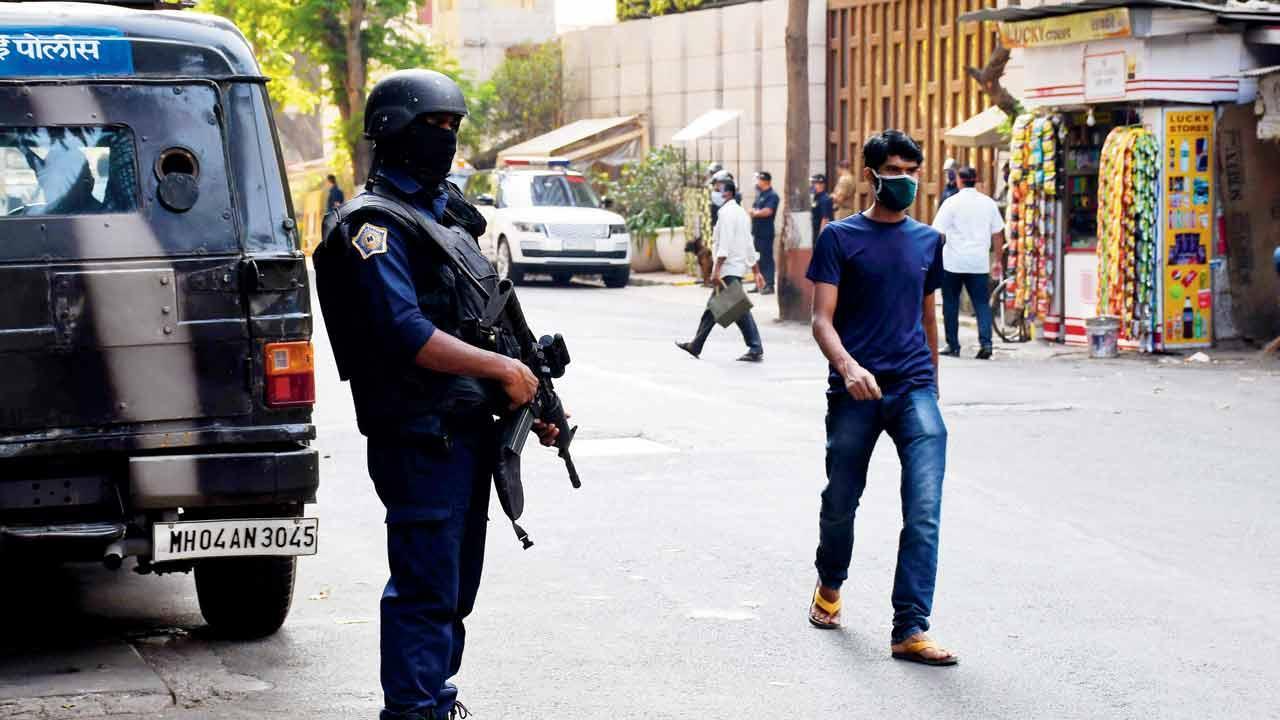Legal experts, academicians and social activists are of the opinion that the central and state agencies should work in close coordination with each other to crack both the Ambani and Hiran cases

High security outside Antilia after a car laden with gelatin sticks was found abandoned at the spot on February 26. File pic
With both the National Investigation Agency (NIA) and the Anti-Terrorism Squad (ATS) investigating the Ambani bomb scare case and the murder of Thane-based businessman Mansukh Hiran, experts are of the opinion that there should be proper coordination and cooperation between the state and central agencies and that they should not bend under any kind of political pressure or dictum.
ADVERTISEMENT
Security outside Antilia was beefed up after a car laden with explosives was found outside the building last month. File pic
Academicians and social activists are of the view that both the state and the Centre should adopt the National Police Commission report, which is still on paper, because only then the investigating agencies would work more professionally and with accountability.
Senior criminal lawyer Dinesh Tiwari said, “Theoretically and legally, both the agencies should work professionally, honestly and in close coordination with each other. But practically, at least one agency, if not both, will be guided by political dictum. While following orders of corrupt politicians, justice becomes a casualty. The only ray of hope is the high court monitoring the investigation like a supervisory officer, like it did in the Telgi and MPSC scam cases in the past. And both the cases led to incarceration of many high-ranking people.”
Advocate Tiwari further said, “Different agencies coming out with different findings has become a very common thing nowadays. In fact framers of the law would not have foreseen this kind of eventuality.”
Advocate Rajeshwar Panchal said, “Once an investigation has been taken over by the NIA, then it goes without saying that the previous agency should give all the material collected to it. This will help towards achieving the goal of bringing out the truth. Needless to add that the new investigating agency should also carry out a fair investigation without getting influenced by any political interference.”
Advocate Swapnil Ambure, who practises criminal law, said, “The very purpose of forming these special units like the NIA or ATS gets defeated when politics govern the nature and scope of the investigation. If the agencies work together and assist each other, the truth can come out. Contradictions in their investigation will favour the accused.”
Adding to this, Solicitor Stuti Galiya said, “It is the responsibility of an investigating agency to conduct a transparent and efficient probe. An investigation, for which different agencies have been appointed, needs proper coordination and hand-holding, so that it is done in an effective manner.”
Academicians speak
Dr Vijay Raghavan, professor, Centre for Criminology and Justice, Tata Institute of Social Sciences (TISS), said, “The police force is the most important wing of the state and the moot issue here is that every state wants to control it and curtail their autonomy to work independently. Same is the case with central investigating agencies.”
When asked to elaborate, Dr Raghavan explained, “Over the years, several committees were set up by the government to look into reforms of the police system in India, which was enacted way back in 1861. The National Police Commission had come out with nine reports on how to reform the police system in India between 1979 and 1981, but most of it is still on paper even today. A landmark PIL filed in the Supreme Court by retired DGP Prakash Singh had insisted for implementation of the key recommendations, to which the apex court in the year 2006 gave specific directions to the central and state governments to carry out structural changes in the police system with a view to insulate it from extraneous pressures and make it accountable to the people.”
Police subordination
He further added, “The subordination of the police has threatened the foundations of democratic functioning by allowing people in power to get away even with violations of laws. This has resulted in violations of the rights of citizens through unauthorised detentions, torture, harassment, fabrication of evidence, malicious prosecutions, etc. The solution lies in implementing the National Police Commission recommendations in letter and spirit and by giving the police autonomy and making them accountable. Only then the state and central agencies can work professionally without any undue influence.”
Mohammed Tarique, director of Koshish, which is working on issues of urban poverty, especially homelessness, destitution and institutional populations, said, “Unfortunately, issues and concerns regarding the quality of investigation or independence of the police come up whenever some high-profile case happens. Police reforms are a long-pending thing.”
“While a court-monitored investigation can bring some reassurance for the general public, the question is whether that can be an answer to the police reforms. Efficient and unbiased working of the police is critical for building citizens’ confidence in the legal processes. It’s high time that all necessary reforms and modernisation plans are implemented,” added Tarique.
 Subscribe today by clicking the link and stay updated with the latest news!" Click here!
Subscribe today by clicking the link and stay updated with the latest news!" Click here!






